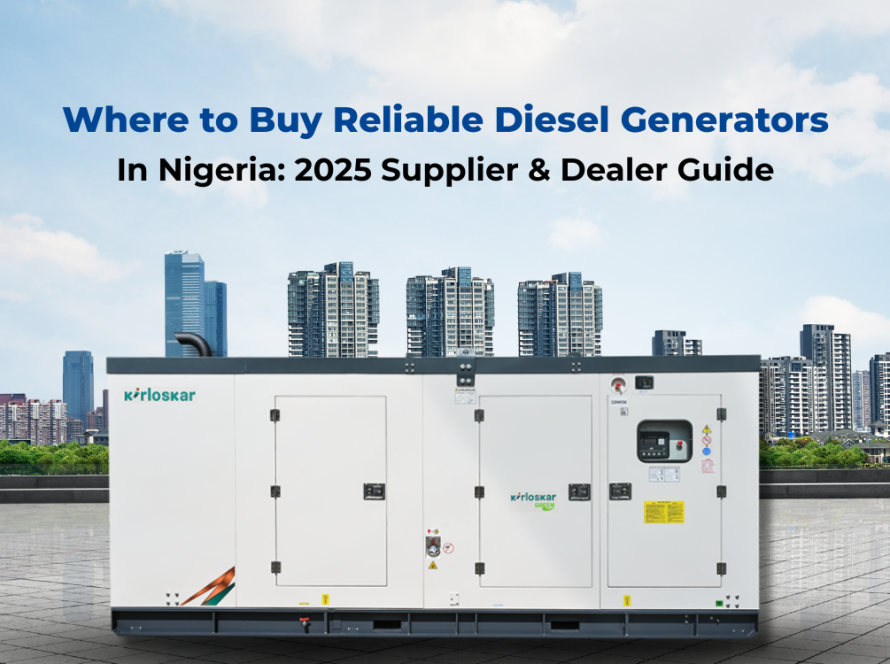In the dynamic and often demanding operational landscape of West Africa, a reliable generator is more than just backup power – it’s a cornerstone of business continuity and operational efficiency. Investing in a quality genset is a significant commitment, and ensuring its longevity is paramount. The unique environmental conditions of West Africa, characterized by heat, humidity, dust, and sometimes challenging fuel quality, necessitate a proactive and informed approach to operation and maintenance.
This blog outlines essential best practices tailored to the West African context, empowering businesses and individuals to maximize the lifespan and performance of their gensets, ensuring consistent power for years to come.
1. Site Selection and Proper Installation: Laying a Solid Foundation
The journey to a long-lasting genset begins even before it’s switched on. Proper site selection and installation are critical in mitigating the impact of West Africa’s climate:
- Ventilation is Key: Adequate airflow is crucial to dissipate heat, especially in the tropical climate. Ensure the genset is installed in a well-ventilated area, away from direct sunlight where possible.
- Protection from the Elements: Shield the genset from excessive dust and rain. Consider a dedicated enclosure with proper ventilation to minimize the ingress of harmful particles and moisture, both prevalent in many parts of West Africa.
- Stable and Level Surface: Install the genset on a stable and level concrete base to prevent vibrations and potential structural stress.
- Safe Fuel Storage: Store fuel in appropriate containers, away from direct heat sources, and ensure proper ventilation in the storage area to prevent vapor buildup, a significant safety concern in hotter regions.
2. Adhering to Manufacturer Guidelines: The Operational Bible
The manufacturer’s operation and maintenance manual is your most valuable resource. It provides specific instructions tailored to your genset model. Deviating from these guidelines can significantly reduce its lifespan and void warranties. Pay close attention to recommended operating hours, load limits, and scheduled maintenance intervals.
3. Implementing a Rigorous Maintenance Schedule: Proactive Care is Paramount
Regular maintenance is non-negotiable for extending your genset’s life in West Africa’s demanding environment:
- Daily Checks: Before operation, or at the start of each day, inspect for leaks (fuel, oil, coolant), check fluid levels, and ensure no visible damage or loose connections.
- Weekly Exercises: Run the genset under a reasonable load (around 50-75% of its capacity if possible) for about 30-60 minutes weekly. This lubricates internal components, burns off moisture, and ensures it’s ready when needed. Avoid prolonged no-load running, which can lead to “wet stacking” in diesel engines.
- Monthly Deep Dive: Inspect air filters (clean or replace as needed, more frequently in dusty areas), check battery terminals for corrosion (humidity accelerates this), examine belts and hoses for wear and tear (heat can cause premature degradation), and drain any water from the fuel tank (high humidity increases condensation).
- Annual Overhaul (with Professional Assistance): This is crucial. Engage a qualified technician for a comprehensive inspection, including oil and filter changes (oil, fuel, air), cooling system flush and inspection, valve adjustments, injector testing, and electrical system checks. Their expertise is invaluable in identifying potential issues before they escalate.
4. Fuel Management: Quality Matters
The quality of fuel significantly impacts engine performance and longevity. In West Africa, fuel quality can sometimes be inconsistent.
- Source Reliable Fuel: старайтесь приобретать топливо у проверенных поставщиков.
- Implement Filtration: Use good quality fuel filters and consider installing additional pre-filters to remove contaminants and water before they reach the engine.
- Proper Storage: Store fuel in clean, sealed containers to prevent contamination and degradation, especially in hot conditions. Avoid storing fuel for excessively long periods.
5. Lubrication Excellence: Reducing Friction and Wear
Using the correct type and grade of lubricant, as specified by the manufacturer, is vital. Regular oil changes, adhering to the recommended intervals, are crucial for minimizing friction and wear on engine components, especially under the stress of continuous operation in a hot climate.
6. Cooling System Efficiency: Combating the Heat
Overheating is a major threat in West Africa’s climate. Ensure the cooling system is functioning optimally:
- Maintain Coolant Levels: Regularly check and top up with the correct coolant mixture.
- Inspect Radiator: Keep the radiator clean and free from dust and debris, which can significantly impede heat dissipation.
- Check for Leaks: Promptly address any leaks in hoses or the radiator.
7. Battery Care: Ensuring Reliable Starts
A weak or dead battery is a common cause of genset failure. Regularly check battery terminals for corrosion, ensure secure connections, and monitor electrolyte levels (if applicable). Consider using a battery maintainer, especially for infrequently used gensets.
By diligently implementing these best practices, tailored to the unique challenges of the West African environment, you can significantly extend the lifespan of your genset, ensure its reliable performance, and safeguard your power supply for years to come. Investing in proactive maintenance is an investment in the longevity and dependability of your essential power solution.


